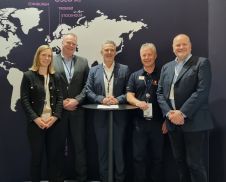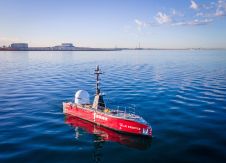FIG Commission 4 - Chair’s report on the 6th FIG Regional Conference
The 6th FIG Regional Conference was held this past November in San José (Costa Rica). This regional conference focused on providing answers to specific challenges faced within Central America, particularly within the coastal zone. Commission 4 was called upon to deliver technical sessions dealing with coastal zone management (CZM), the administration of marine spaces and capacity building.<P>
Regarding the latter issue,the International Hydrographic Organization was keen to participate and to make contact with local stakeholders in regards to promoting the benefits of developing hydrographic capacity within the region because, to date, Costa Rica has not established a national hydrographic office. The objective of this conference was also to educate and provide guidance to regional land professionals towards practicing sustainable land development and management by focusing specific research and good practice presentations during the technical programme.
Overview of Presentations
Commission 4 contributed to a number of sessions within the technical programme. Dr Michael Sutherland (Canada) presented two papers: the first was during the opening plenary entitled Coastal Zone Management as Strategy for Pro-poor Land Management and Administration , and the second was entitled International Issues in Administering Marine Spaces . He also chaired a technical session on CZM and was joined by commission officers Mr Gordon Johnston (UK), Andrew Leyzack (Canada) and representatives from commissions 3, 7 and 8 for a workshop on pro-poor CZM. The workshop, which was chaired by Mr Rob Mahoney (UK), served as a starting point for work on a FIG publication on the topic. Mr Gordon Johnston chaired a session on Administering Marine Spaces and Andrew Leyzack chaired a session on the Economic Benefits of Hydrography. The latter session included an invited paper entitledThe Value of Hydrographic Information and its Influencefrom Captain Hugo Gorziglia (Chile), Director of the International Hydrographic Bureau. Other invited papers for the Commission 4 sessions were:
• Marine Geospatial Software: Generating Economic Benefits from Hydrographic Data and its Management , by Mr Serge Lévesque and Mr Alexis Cardenas (Canada)
• Surveys for Shoreline Monitoring Programme , by Mr Teo Chee Hai (Malaysia)
• Economic Benefits of Hydrography in Terms of Hydrographic Education , by Dr Volker Boeder (Germany).
Past FIG president, Mr Rob Foster (USA), presented an interesting paper entitled Where’s the Shoreline? Sources of Historical and Contemporary High Water Position Developed in the Context of Massachusetts’ Coastal Regulations . The paper illustrated the extent of public access to lands within the greater Boston area created as a result of centuries of land reclamation.
Summary
The Conference provided a focused forum for FIG to link land and hydrographic surveying expertise to address the topics raised by the region. The following summary draws together key points raised during the various Commission 4 presentations. Given the dynamic nature of the land–sea interface, we ought to change our thinking that the role of the land surveyor ends at the water-line. Tanah Air , the Malaysian expression for ‘homeland’, translates to the words land and sea. Its meaning is inclusive of both land and sea, and gives recognition to the submerged lands below the shore. A comprehensive understanding of land both above and below the sea and changes effected by the dynamics within this area is based on an integrated approach to land and hydrographic surveying. This would include a programme of continual monitoring of changes to the shoreline.
Article 76 of the United Nations Convention on the Law of the Sea (UNCLOS) illustrates the land–sea interface and describes those submerged lands to which a coastal state may be entitled. To benefit from the UNCLOS, it is therefore important that a developing coastal state accurately surveys its coastal zone area, and implements and maintains a land use management and property rights system that extends into its offshore area.
Key to defining and managing the extent of ownership and rights within a coastal area is an accurate definition of shoreline; both high and low water, with the latter serving as a baseline to project seaward boundaries of a territorial sea and beyond.
So, to arrive at a complete picture, it would be necessary for the surveyor to take a multidisciplinary (land and hydrographic) approach to, first, accurately delineate shoreline as high water and low water lines of elevation using tidal data as the basis for establishing these. The surveyor should then gather the necessary data to provide information on the effects of both man-made and natural change on the rights of those who inhabit the coastal zone. Hydrographic surveying is needed to fulfil a coastal state’s obligation to chart its waters under Article 5 of Safety of Life at Sea (SOLAS).
Good hydrography provides a basis for the effective use and maintenance of port infrastructure from which economic benefits may be realised. Hydrographic data are needed to secure ownership and rights to a coastal state’s adjacent offshore area.
Hydrographic surveying is essential to acquire data and transform it into information necessary for making informed decisions for the delineation and effective management of the coastal zone and those submerged lands offshore. Hydrographic education is required for a coastal state to build capacity to practice hydrography.
Papers from the 6th FIG Regional Conference can be found on the FIG website.
The links between land and hydrographic surveying are the theme of an upcoming FIG-sponsored conference to be held in Victoria (Canada), on 5–8 May 2008. The Association of Canada Lands Surveyors and the Canadian Hydrographic Association are co-hosting a National Surveyor’s Conference and Canadian Hydrographic Conference entitledBringing Land and Sea Together. The next Commission 4 meeting will be held during this conference, where offshore issues including the role of the surveyor in the administration of marine spaces will be discussed. For more information, please visit the conference website.
Our next working week will be held in Stockholm (Sweden), on 14–19 June 2008. The theme Integrating Generations will focus on present and future surveying issues including recruitment, qualifications and capacity building. For more information, please visit the Working Week website.

Value staying current with hydrography?
Stay on the map with our expertly curated newsletters.
We provide educational insights, industry updates, and inspiring stories from the world of hydrography to help you learn, grow, and navigate your field with confidence. Don't miss out - subscribe today and ensure you're always informed, educated, and inspired by the latest in hydrographic technology and research.
Choose your newsletter(s)
























